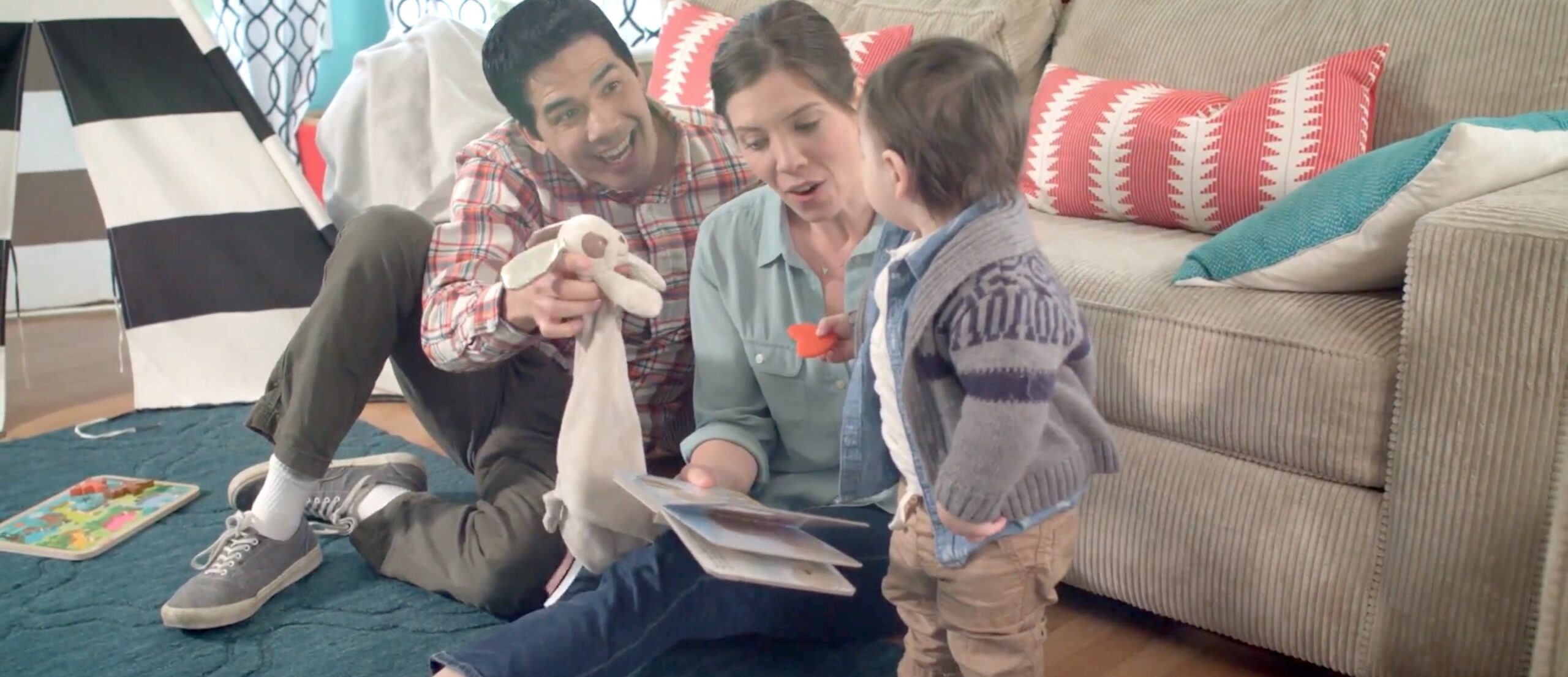
You’re probably very familiar with your own inner voice, but how does your child’s inner voice develop? It comes from you. Your words and tone become the inner voice your child hears when she talks to herself. You can help nurture a positive inner voice that promotes self-regulation and confidence in your child by modeling self-talk.
Self-talk is observed talk spoken to oneself. It’s your personal narrative. From birth, you can model self-talk with your child by adding words and emotions to everyday activities like dressing, bathing, playing, or eating, and in your daily comings and goings.
When you take the time to describe and narrate what occurs in the moment, you are helping support your child’s self- talk, language development, self-regulation, and self-worth.
Self-talk creates a link between your child’s inner and outer worlds. Use our tips to foster an inner helper instead of an inner critic. And remember to keep your own inner voice positive, too!
For example, Lucy is mastering a new skill: crawling!
• Mark puts his daughter Lucy on the floor and comments on Lucy’s attempts to crawl.
• As Lucy gets up to her hands and knees, Mark says, “You can do it, Lucy is working hard! Yes!”
• When Lucy collapses, her father says, “Wow, Lucy! You did it!”
• Lucy smiles at Mark and they continue this interaction until Lucy gets tired.
These early reassuring interactions serve as the basis for the development of positive self-talk. Empower your child with a healthy, happy inner voice!
| Cookie | Duration | Description |
|---|---|---|
| __stripe_mid | 1 year | Stripe sets this cookie cookie to process payments. |
| __stripe_sid | 30 minutes | Stripe sets this cookie cookie to process payments. |
| cookielawinfo-checkbox-advertisement | 1 year | Set by the GDPR Cookie Consent plugin, this cookie is used to record the user consent for the cookies in the "Advertisement" category . |
| cookielawinfo-checkbox-analytics | 11 months | This cookie is set by GDPR Cookie Consent plugin. The cookie is used to store the user consent for the cookies in the category "Analytics". |
| cookielawinfo-checkbox-functional | 11 months | The cookie is set by GDPR cookie consent to record the user consent for the cookies in the category "Functional". |
| cookielawinfo-checkbox-necessary | 11 months | This cookie is set by GDPR Cookie Consent plugin. The cookies is used to store the user consent for the cookies in the category "Necessary". |
| cookielawinfo-checkbox-others | 11 months | This cookie is set by GDPR Cookie Consent plugin. The cookie is used to store the user consent for the cookies in the category "Other. |
| cookielawinfo-checkbox-performance | 11 months | This cookie is set by GDPR Cookie Consent plugin. The cookie is used to store the user consent for the cookies in the category "Performance". |
| CookieLawInfoConsent | 1 year | Records the default button state of the corresponding category & the status of CCPA. It works only in coordination with the primary cookie. |
| elementor | never | This cookie is used by the website's WordPress theme. It allows the website owner to implement or change the website's content in real-time. |
| viewed_cookie_policy | 11 months | The cookie is set by the GDPR Cookie Consent plugin and is used to store whether or not user has consented to the use of cookies. It does not store any personal data. |
| Cookie | Duration | Description |
|---|---|---|
| mailchimp_landing_site | 1 month | The cookie is set by MailChimp to record which page the user first visited. |
| Cookie | Duration | Description |
|---|---|---|
| _ga | 2 years | The _ga cookie, installed by Google Analytics, calculates visitor, session and campaign data and also keeps track of site usage for the site's analytics report. The cookie stores information anonymously and assigns a randomly generated number to recognize unique visitors. |
| _gat_gtag_UA_46801669_2 | 1 minute | Set by Google to distinguish users. |
| _gid | 1 day | Installed by Google Analytics, _gid cookie stores information on how visitors use a website, while also creating an analytics report of the website's performance. Some of the data that are collected include the number of visitors, their source, and the pages they visit anonymously. |
| tk_lr | 1 year | The tk_lr is a referral cookie set by the JetPack plugin on sites using WooCommerce, which analyzes referrer behaviour for Jetpack. |
| tk_or | 5 years | The tk_or is a referral cookie set by the JetPack plugin on sites using WooCommerce, which analyzes referrer behaviour for Jetpack. |
| tk_r3d | 3 days | JetPack installs this cookie to collect internal metrics for user activity and in turn improve user experience. |
| tk_tc | session | JetPack sets this cookie to record details on how user's use the website. |
| Cookie | Duration | Description |
|---|---|---|
| cookies.js | session | No description available. |
| m | 2 years | No description available. |
This content is exclusive to CuddleBright® customers.
Experience CuddleBright® today!
Already a customer? Login to view.